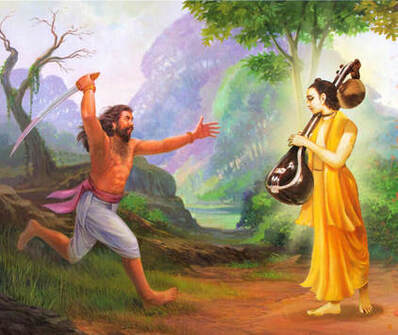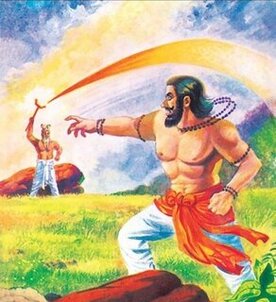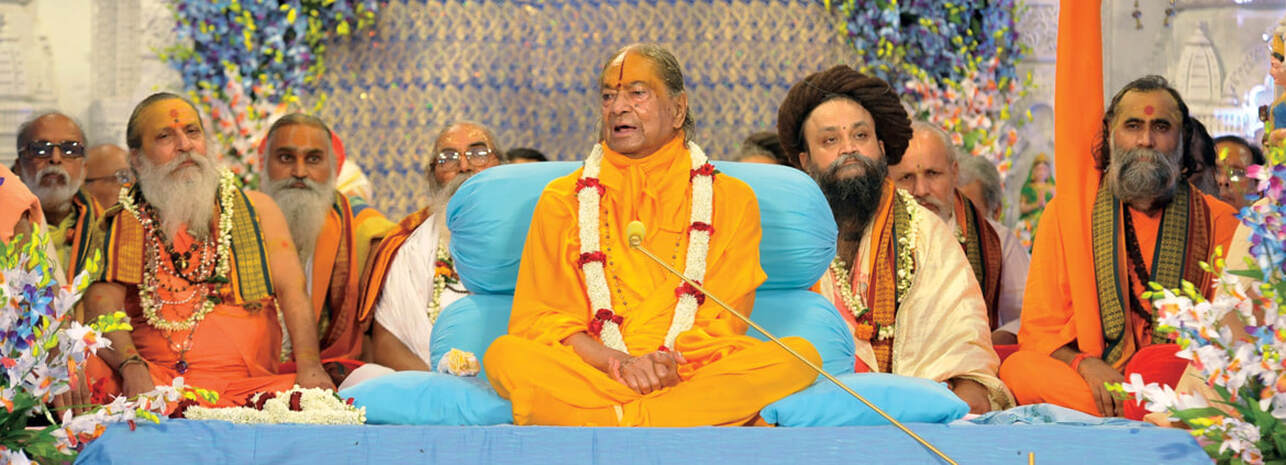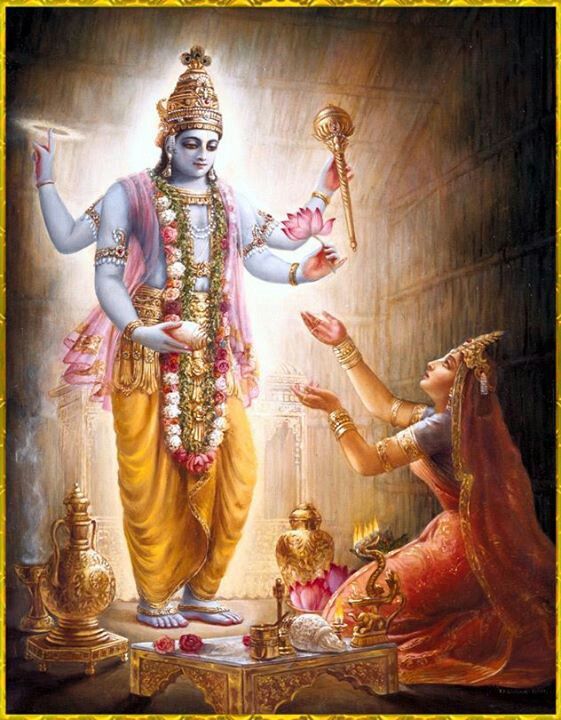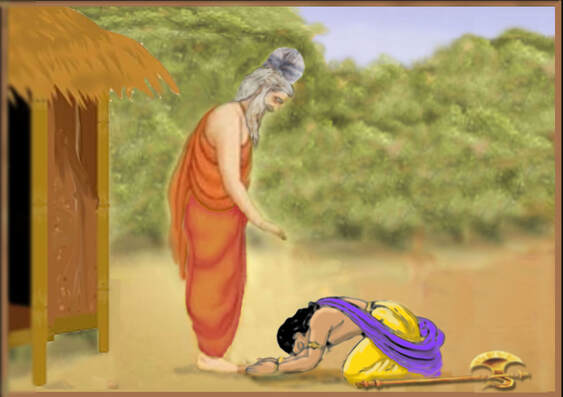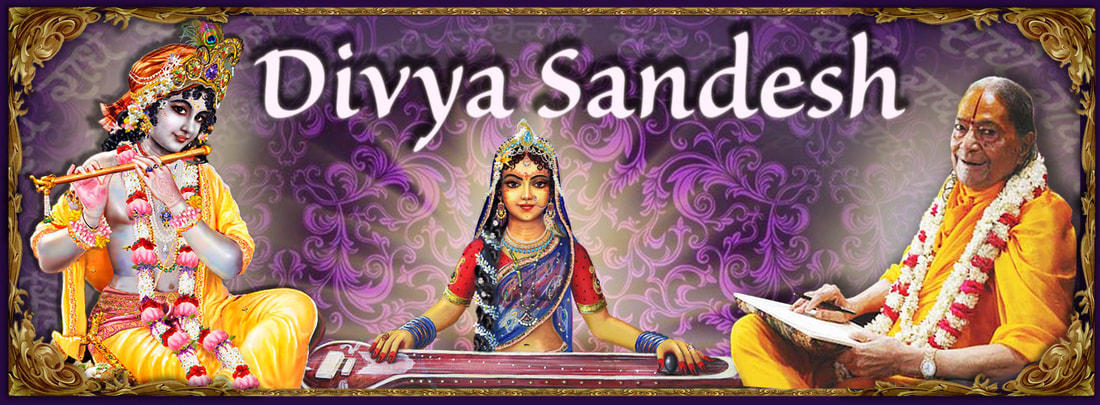2022 Guru Poornima
|
Philosophy
Guru-MahatmyaIn scriptures, there are many narrations where abominable people realized God in the same lifetime by the grace of Guru. Want to know more about such a Guru and how to have similar results? Read the article below and put those concepts into practise.
|
Kripalu Leelamritam
Guru Tests DevotionOn a cold winter night Shri Maharaj Ji decided to test Mahabani ji...
|
Kids Story
Guru - Embodiment of GraceHow did Vishwamitra become Brahmarishi from Rajrishi in the same life?
|
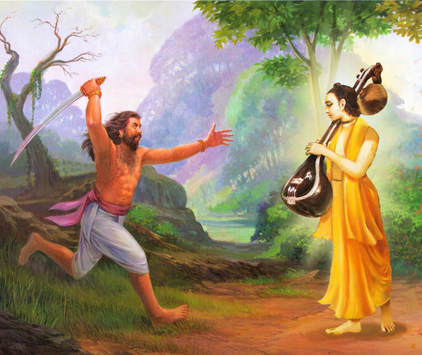 Story of Dacoit Ratnakar who transforms into Sage Valmiki
Story of Dacoit Ratnakar who transforms into Sage Valmiki
The notorious dacoit Ratnakar was so sinful that he could not pronounce the name Ram, though he could individually pronounce the syllables ‘Ra’ and ‘ma’. The same sinner Ratnakar, upon surrendering to a Guru and following his instructions had a change of heart and underwent
a complete transformation to become a great saint who we now know as Rishi Valmiki. Rishi Valmiki wrote the Ramayana even before the descension of Shri Ram.
By completely surrendering to her Guru and selflessly serving him, an illiterate tribal woman by the name of Shabari gained the highest spiritual knowledge, deserving of Lord Shri Ram's grace. Through her devotion to her Guru, Shabari attained God realization in that very birth. Such is the glory of a genuine Guru. Life without a Guru is meaningless. It is the Guru who opens the eyes of the Jeev blinded by Maya and makes them understand the divine philosophy such as “who am I”, “who is mine”, and “the nature of the world”. The Guru is also the one, who ultimately bestows divine love on the devotee.
a complete transformation to become a great saint who we now know as Rishi Valmiki. Rishi Valmiki wrote the Ramayana even before the descension of Shri Ram.
By completely surrendering to her Guru and selflessly serving him, an illiterate tribal woman by the name of Shabari gained the highest spiritual knowledge, deserving of Lord Shri Ram's grace. Through her devotion to her Guru, Shabari attained God realization in that very birth. Such is the glory of a genuine Guru. Life without a Guru is meaningless. It is the Guru who opens the eyes of the Jeev blinded by Maya and makes them understand the divine philosophy such as “who am I”, “who is mine”, and “the nature of the world”. The Guru is also the one, who ultimately bestows divine love on the devotee.
गुरुर्ब्रह्मा गुरुर्विष्णुः गुरुर्देवो महेश्वरः । गुरुः साक्षात् परब्रह्म तस्मै श्री गुरवे नमः ॥
gururbrahmā gururviṣṇuḥ gururdevo maheśvaraḥ
guruḥ sākṣāt parabrahma tasmai śrī gurave namaḥ
gururbrahmā gururviṣṇuḥ gururdevo maheśvaraḥ
guruḥ sākṣāt parabrahma tasmai śrī gurave namaḥ
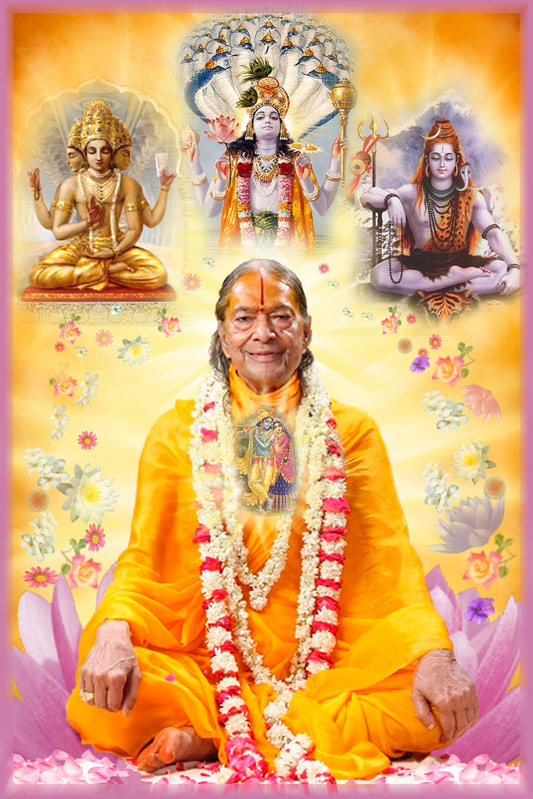 Guru is Brahma, Vishnu and Shiva
Guru is Brahma, Vishnu and Shiva
Guru is called Brahma because he enlightens his disciple with spiritual knowledge. He is called Vishnu because he protects that knowledge as the disciple treads on the path prescribed by him. He is called Shiva because he destroys the ignorance and faults of the disciple. He bestows spiritual knowledge and brings brightness into a disciple's life and liberates him from the cycle of life and death. In fact, Guru is considered to be a living form of God Himself. Hence, there is no entity that can be compared to a Guru in the entire universe.
Guru Poornima is the day of the adoration of the Guru. Not just love but
“adoration” which means very intense love. A Guru is adored incessantly by
his disciples. And those disciples avail this opportunity to express their love
and respect towards their Guru to please Him on this auspicious day of the
year.
So, how can one get to this stage of “adoration” of a Guru?
First, one needs to understand who can be called a Guru. Then they need
to approach the Guru to attain the knowledge of philosophy and finally
follow his instructions. To attain spiritual maturity, one must invest time
and effort in acquiring Tattva Gyan (1) and then putting that into
practice. In the beginning, everyone falters due to the impressions from
their previous lifetimes. Ratnakar and Shabari had already invested that
time and effort in their previous lifetimes and so when they met their
Guru, they developed instantaneous faith and fully surrendered
themselves unto their Guru. For some of us that instantaneous faith may
not happen. We may need to put in a lot more time and effort to get to
their stage.
And what if life ends before we attain complete faith and surrender
ourselves?
Even in that case, we must not lose hope. This process will start from here we ended in this lifetime and continue over numerous lifetimes
until we get to the stage of complete surrender, which is the true essence of celebrating Guru Poornima. As you progress on the path of spirituality,
the adoration for Guru will automatically grow. And one day, you will develop the kind of faith and level of surrender that Valmiki and Shabari
had for their Guru.
Let us learn more about this step-by-step process in this article.
First let us ponder upon how to identify a genuine Guru. In this age of Kaliyuga, one can be easily confused, since there are many imposters
claiming to be a Guru. How do we separate the grain from the chaff? To identify a genuine Saint, it would be imperative to know a few things -
Once you understand the above, you need to increase your longing to meet such a Guru. The all-merciful God will certainly bring the right Guru
in your life. Then, as you follow the Guru's instructions and surrender to him, you cannot help but adore him incessantly.
Guru Poornima is the day of the adoration of the Guru. Not just love but
“adoration” which means very intense love. A Guru is adored incessantly by
his disciples. And those disciples avail this opportunity to express their love
and respect towards their Guru to please Him on this auspicious day of the
year.
So, how can one get to this stage of “adoration” of a Guru?
First, one needs to understand who can be called a Guru. Then they need
to approach the Guru to attain the knowledge of philosophy and finally
follow his instructions. To attain spiritual maturity, one must invest time
and effort in acquiring Tattva Gyan (1) and then putting that into
practice. In the beginning, everyone falters due to the impressions from
their previous lifetimes. Ratnakar and Shabari had already invested that
time and effort in their previous lifetimes and so when they met their
Guru, they developed instantaneous faith and fully surrendered
themselves unto their Guru. For some of us that instantaneous faith may
not happen. We may need to put in a lot more time and effort to get to
their stage.
And what if life ends before we attain complete faith and surrender
ourselves?
Even in that case, we must not lose hope. This process will start from here we ended in this lifetime and continue over numerous lifetimes
until we get to the stage of complete surrender, which is the true essence of celebrating Guru Poornima. As you progress on the path of spirituality,
the adoration for Guru will automatically grow. And one day, you will develop the kind of faith and level of surrender that Valmiki and Shabari
had for their Guru.
Let us learn more about this step-by-step process in this article.
First let us ponder upon how to identify a genuine Guru. In this age of Kaliyuga, one can be easily confused, since there are many imposters
claiming to be a Guru. How do we separate the grain from the chaff? To identify a genuine Saint, it would be imperative to know a few things -
- Definition of Guru
- Who qualifies to be a Guru thereby also understand
- Benefits of Worshipping Guru and
- How to obtain knowledge from Guru
Once you understand the above, you need to increase your longing to meet such a Guru. The all-merciful God will certainly bring the right Guru
in your life. Then, as you follow the Guru's instructions and surrender to him, you cannot help but adore him incessantly.
In modern times, the word Guru is used to mean “an expert in a field”. However, the meaning of Guru in Sanskrit language is significantly different from the contemporary meaning.
In Sanskrit the word Guru has 2 meanings -
In Sanskrit the word Guru has 2 meanings -
गुं रौतीति गुरु: ।
guṃ rauti iti guruh
guṃ rauti iti guruh
“The one who dispels the darkness of ignorance is Guru.”
गुशब्दस्त्वंधकारत्वात्, रुशब्दस्तन्निरोधतः । तस्मादंधकारनिरोधत्वात् गुरूरित्यभिधीयते ॥
guśabdastvaṃdhakāratvāt, ruśabdastannirodhataḥ । tasmādaṃdhakāranirodhatvāt gurūrityabhidhīyate ॥
guśabdastvaṃdhakāratvāt, ruśabdastannirodhataḥ । tasmādaṃdhakāranirodhatvāt gurūrityabhidhīyate ॥
“The word Gu means dark and Ru means destroyer. Guru dispels the darkness of ignorance, that’s why he is called Guru.”
The other definition is -
The other definition is -
गृणाति ज्ञानं इति गुरु: ।
gṛṇāti jñānaṃ iti guruḥ
gṛṇāti jñānaṃ iti guruḥ
“The one who imparts divine wisdom is Guru”.
We can infer from these definitions that a teacher of a particular subject such as music, dance and various sciences cannot be designated as Guru. This is because such a teacher can provide knowledge of only one subject. Also, his own knowledge on that one subject is incomplete. Thus, he does not have the competence to uproot the darkness of ignorance of his disciple. It also denotes any material being cannot be entitled to be called Guru, since they are also subjugated by Maya, the mother of ignorance.
With this it can be deduced that no one under the control of Maya can have the ability to be called Guru.
We can infer from these definitions that a teacher of a particular subject such as music, dance and various sciences cannot be designated as Guru. This is because such a teacher can provide knowledge of only one subject. Also, his own knowledge on that one subject is incomplete. Thus, he does not have the competence to uproot the darkness of ignorance of his disciple. It also denotes any material being cannot be entitled to be called Guru, since they are also subjugated by Maya, the mother of ignorance.
With this it can be deduced that no one under the control of Maya can have the ability to be called Guru.
Let us delve deeper into the scriptures to know who has this extraordinary power to remove ignorance of others?
The Vedas emanated from the mouth of Supreme God
The Vedas emanated from the mouth of Supreme God
निःश्वसितमस्य वेदाः ।
niḥśvasitamasya vedāḥ ।
niḥśvasitamasya vedāḥ ।
Hence they are the ultimate source of knowledge. They assert -
तद्विज्ञानार्थं स गुरुमेवाभिगच्छेत् समित्पाणि: श्रोत्रियं ब्रह्मनिष्ठम् ।
मुंडकोपनिषद् १.२.१२
tadvijñānārthaṃ sa gurumevābhigacchet
samitpāṇi: śrotriyaṃ brahmaniṣṭham
samitpāṇi: śrotriyaṃ brahmaniṣṭham
Muṇḍakopaniṣad 1.2.12
“It is imperative to be associated with a Spiritual master endowed with 2 requisite qualities -
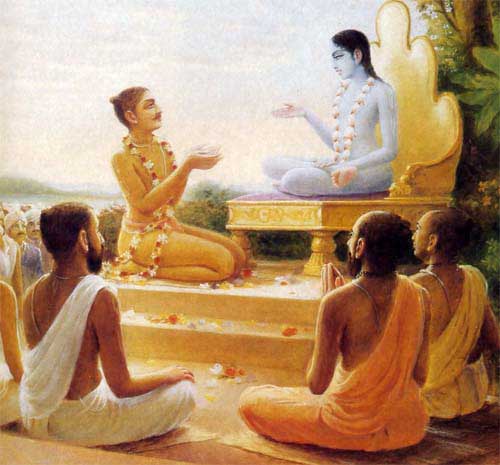 Shukdev Paramhans reciting Shrimad Bhagvatam to King Parikshit
Shukdev Paramhans reciting Shrimad Bhagvatam to King Parikshit
1. He should be śrotriyaṃ, which means one who is endowed with complete and meticulous knowledge of the scriptures and possesses the power to instill that knowledge in our minds
2. Brahmaniṣṭham which means He should be a God realized soul”.
The most essential of these two attributes is being Brahmaniṣṭha. Because a God-realized soul naturally attains perfect knowledge of everything. Yes, everything! This is so because at the time of God realization God bestows all His powers to such a saint. But if he is only śrotriya (1), neither would he be able to resolve all the doubts of an aspirant, nor can he lead the aspirant to realize God realization.
The Bhagavad Gita and Shrimad Bhagavata Mahapurana affirm the
same, “Seek a saint, who possesses the knowledge of the scriptures and is also a God-realized soul. Approach such a saint with a completely surrendered mind. Humbly ask him questions to satisfy your inquisitive mind and serve him selflessly. Then by his grace you would attain the knowledge of the precise direction to reach Me”.
2. Brahmaniṣṭham which means He should be a God realized soul”.
The most essential of these two attributes is being Brahmaniṣṭha. Because a God-realized soul naturally attains perfect knowledge of everything. Yes, everything! This is so because at the time of God realization God bestows all His powers to such a saint. But if he is only śrotriya (1), neither would he be able to resolve all the doubts of an aspirant, nor can he lead the aspirant to realize God realization.
The Bhagavad Gita and Shrimad Bhagavata Mahapurana affirm the
same, “Seek a saint, who possesses the knowledge of the scriptures and is also a God-realized soul. Approach such a saint with a completely surrendered mind. Humbly ask him questions to satisfy your inquisitive mind and serve him selflessly. Then by his grace you would attain the knowledge of the precise direction to reach Me”.
तस्माद् गुरुं प्रपद्येत जिज्ञासु: श्रेय उत्तमम् । शाब्दे परे च निष्णातं ब्रह्मण्युपशमाश्रयम् ॥
भागवत ११.३.२१
tasmādguruṃ prapadyeta jijñāsuh śreya uttamam,
śābde pare ca niṣṇātaṃ brahmaṇyupaśamāśrayam
śābde pare ca niṣṇātaṃ brahmaṇyupaśamāśrayam
Bhāgwatam 11.3.21
Bhagavan-Shri Krishna says, "Submit yourself to a God-realized saint and humbly ask questions to clarify your spiritual doubts.:
śābde pare ca niṣṇātaṃ means, “well versed in scriptural knowledge” and brahmaṇyupaśamāśrayam means, “competent in scriptural knowledge’.
Chaitanya Mahaprabhu, says -
śābde pare ca niṣṇātaṃ means, “well versed in scriptural knowledge” and brahmaṇyupaśamāśrayam means, “competent in scriptural knowledge’.
Chaitanya Mahaprabhu, says -
जेइ कृष्ण तत्त्ववेत्ता, सेइ गुरु हय ।
jei kr̥ṣṇa tatvavēttā vettā, sei guru haya
jei kr̥ṣṇa tatvavēttā vettā, sei guru haya
“The one who has realized God is Guru”.
It is well-understood that no one in the world can learn about a single alphabet of any language without a teacher, let alone attaining mastery of that language. Spiritual knowledge is much more abstruse and inconceivable than the knowledge of any language. When worldly knowledge cannot be attained without a teacher, it should be no surprise that it is equally not possible to attain spiritual knowledge without a genuine spiritual master.
That is why scriptures also emphatically assert the importance of a Spiritual Master (Guru).
Tulsidas Ji says,
That is why scriptures also emphatically assert the importance of a Spiritual Master (Guru).
Tulsidas Ji says,
गुरु बिनु भव निधि तरई न कोई, जो विरन्चि शंकर सम होई ।
guru binu bhav nidhi taree na koee, jo biranchi shankar sam hoee
सो विनु संत न काहू पाई ॥
so vinu saṃta na kāhū pāī
guru binu bhav nidhi taree na koee, jo biranchi shankar sam hoee
सो विनु संत न काहू पाई ॥
so vinu saṃta na kāhū pāī
"Even the most competent one, endowed with the knowledge equivalent to Lord Brahma (creator) and Lord Shankar (annihilator) cannot traverse the ocean of Maya without the grace of a genuine spiritual master".
All these scriptures are unanimously asserting the same thing that It is impossible to know God without the help of a true Spiritual Master; Srotriyaṃ (श्रोत्रियं) - endowed with meticulous knowledge of all the scriptures and Brahmaniṣṭham (ब्रह्मनिष्ठम्) - a God realized soul(3). So, it is established that the Guru knows God.
However, the question is how do we get that knowledge from him?
All these scriptures are unanimously asserting the same thing that It is impossible to know God without the help of a true Spiritual Master; Srotriyaṃ (श्रोत्रियं) - endowed with meticulous knowledge of all the scriptures and Brahmaniṣṭham (ब्रह्मनिष्ठम्) - a God realized soul(3). So, it is established that the Guru knows God.
However, the question is how do we get that knowledge from him?
The Vedas say-
उत्तिष्ठत जाग्रत प्राप्य वरान्निबोधत । कठोपनिषद् १.३.१४
uttishthata jagrata prapt varanibodhatah Kathopanishad, 1.3.14
uttishthata jagrata prapt varanibodhatah Kathopanishad, 1.3.14
“Wake up and approach a saint. Be humble and seek knowledge from him”.
The Gita mentions that one can be benefited with the association and guidance of a real saint only when he abides by the following 3 rules –
1. Tadvid'dhi praṇipātēna (तद्विद्धि प्रणिपातेन) Approach a saint humility with a totally surrendered mind and then
2. paripraśnēna (परिप्रश्नेन) humbly and inquisitively ask questions to remove your doubts
3. sēvayā (सेवया) serve him according to his instructions and interests.
The Gita mentions that one can be benefited with the association and guidance of a real saint only when he abides by the following 3 rules –
1. Tadvid'dhi praṇipātēna (तद्विद्धि प्रणिपातेन) Approach a saint humility with a totally surrendered mind and then
2. paripraśnēna (परिप्रश्नेन) humbly and inquisitively ask questions to remove your doubts
3. sēvayā (सेवया) serve him according to his instructions and interests.
Then and only then Upadēkṣyanti tē jñānaṁ jñāninastattavadarśinaḥ (उपदेक्ष्यन्ति ते ज्ञानं ज्ञानिनस्तत्त्वदर्शिन:) which means such an enlightened Saint can impart knowledge unto you. Otherwise, the saint might keep providing spiritual knowledge, yet the disciple would not grasp anything. Faith in the words of Guru and implementation of his instructions is indispensable.
In a nutshell, if someone obtains shelter of a real Guru (who is endowed with scriptural knowledge, divine love and also an ability to infuse the true knowledge in the mind of an inquisitive soul), then there will be no delay in realization of God. He will then get absolute liberation from the miseries and attain unlimited divine bliss.
Narad Ji gave the same message to Prahlad, when he was in the womb of his mother saying,
गुरुशुश्रूषया भक्त्या सर्वलब्धार्पणेन च ।
संगेन साधुभक्तानामीश्वराराधनेन च ॥
संगेन साधुभक्तानामीश्वराराधनेन च ॥
भा. ७.७.३०
|
guruśuśrūṣayā bhaktyā sarvalbadhārpaṇena ca,
saṃgena sādhubhaktānāmīśvarārādhanena ca Bhāgwatam 7.7.30
“Although, there are many ways to realize God, yet the best and easiest way is the selfless service to your Spiritual Master with pure devotion and self-sacrifice ”.
This is why Aditi said to Lord Krishna, भक्तिर्यथा हरौ मेऽस्ति, तद्वरिष्ठा गुरौ यदि ।
ममास्ति तेन सत्येन, संदर्शयतु मे हरि: ॥ पद्म पुराण
bhaktiryathā haraume'sti tadvariṣṭhā gurau yadi,
mamāsti tena satyena saṃdarśayatu me harih Padma Purāṇa
“If it is true that my devotion to my Guru is superior than my devotion to you, please show me your beautiful divine form right now.” And Shri Krishna had to appear.
|
The Bhagwat asserts emphatically -
आचार्यं मां विजानीयान्नावमन्येत कर्हिचित् । न मर्त्य बुद्ध्याऽ सूयेत सर्व देवमयो गुरु: ॥
भा. १.१७.२७
ācāryaṃ māṃ vijānīyānnāvamanyetakarhicit, na martyabuddhyā'sūyeta sarva devamayo guruh
Bhāgwatam, 1.17.27
Shri Krishna said “Uddhava! A true aspirant must see Me in Guru. Neither should he insult Guru at any cost nor consider him as an ordinary being. Guru is the embodiment of all forms of God.”
Out of all the most serious spiritual transgressions, disrespecting a saint (Namaparadh) (2) is the most severe one.
Out of all the most serious spiritual transgressions, disrespecting a saint (Namaparadh) (2) is the most severe one.
भावोऽप्यभावमायाति कृष्णप्रेष्ठापराध्तः
bhāvo'pyabhāvamāyāti kṛṣṇapreṣṭhāparādhtaḥ
bhāvo'pyabhāvamāyāti kṛṣṇapreṣṭhāparādhtaḥ
"God cannot tolerate offense to His beloved devotees". Envision the history of Chaitanya Mahaprabhu, where he summoned the Sudarshan chakra against Jagai Madhai since they disrespected Nityanand Ji. Similarly Shri Krishna sent Sudarshan Chakra after Durvasa when Durvasa insulted His exclusive devotee king Ambarish. So, be very careful that you never perform Namaparadh (2) against a saint. Or else you will lose the keys to all of your spiritual wealth (4).
It is important to practically implement this knowledge. By their unconditional surrender, unflinching faith in such a Guru, Ratnakar and Shabari attained spiritual wealth in the same lifetime. If you have found a true Spiritual Master and wish to attain similar spiritual benefit then the next step would be to surrender to him fully.
Mentioned below are the answers to the question "how to worship such my Guru" to further deepen our surrender and faith in Him. While doing all physical activities, always remember that it is the mind that has to surrender.
Let us now learn how to worship the Guru.
It is important to practically implement this knowledge. By their unconditional surrender, unflinching faith in such a Guru, Ratnakar and Shabari attained spiritual wealth in the same lifetime. If you have found a true Spiritual Master and wish to attain similar spiritual benefit then the next step would be to surrender to him fully.
Mentioned below are the answers to the question "how to worship such my Guru" to further deepen our surrender and faith in Him. While doing all physical activities, always remember that it is the mind that has to surrender.
Let us now learn how to worship the Guru.
|
Our Guru leads us on the path of ultimate bliss. That is why a true devotee adores Guru every moment of our life and even more so on the day of Guru Poornima.
Now, let us pay our homage to our venerable Spiritual Master with these verses: प्रथमं सद्गुरुं वन्दे, श्रीकृष्णं तदनन्तरम् ।
गुरु: पापात्मनां त्राता, श्रीकृष्णस्त्वमलात्मनाम् ॥ prathamaṃ sad guruṃ vande śrīkṛṣṇaṃ tadanantaram, guruh pāpātmanāṃ trātā śrīkṛṣṇastvamalātmanām "Let us adore our revered Guru first, and then pay our respects to Lord Krishna. Because, the Guru delivers the fallen souls like us whereas Lord Krishna delivers only the pure in heart."
गुरुः कृपालुर्म शरणम्। वन्देऽहं सद्गुरु चरणम्॥
guruḥ kṛpālurma śaraṇam। vande'haṃ sadguru caraṇam॥ “I surrender at the Lotus feet of my merciful master. I pay obeisance to my Sadguru’s feet.”
|
औरन को गुरु हो य न हो गुरु मेरो कृपालु सुभाग हमारो
aurana ko guru ho ya na ho guru mero kṛpālu subhāga hamāro
aurana ko guru ho ya na ho guru mero kṛpālu subhāga hamāro
“I don’t care if others have a Guru or not, but I feel highly blessed having Shri Kripalu Mahaprabhu as my revered Guru.”
So, the authentic way of celebrating Guru Poornima is to wake up early, and offering your gratitude towards Him by offering flowers and worship His lotus feet with applying chandan (sandalwood paste) to His lotus feet with immense love and respect. Then engage your mind in His loving remembrance while chanting God’s and Guru’s glories the whole day. Make a firm resolution to completely surrender unto Him and follow all His teachings and instructions.
If you enjoyed this one, you might also like
This is a story when Shri Maharaj Ji used to stay with Mahabani Ji in Pratapgarh and how Shri Maharaj Ji tested Mahabani Ji's devotion on a cold winter night...
The festival of Diwali was round the corner. To celebrate it with Shri Maharaj Ji, almost 50 devotees from the nearby cities came over to Mahabani Ji’s house, unannounced. It just happened to get unusually cold that night. In those days people used to travel with a bedding (holdall) which consisted of a slim cotton mattress, pillows, sheets and a quilt. None of those devotees brought any bedding along with them. In addition to Shri Maharaj Ji, Mahabani Ji’s family had 6 people . They had a few spares quilts and mattresses but not enough accommodate a group of 50 devotees. To make everyone comfortable, Mahabani Ji’s family requested neighbors to let them borrow some spare quilts and mattresses and people doubled up inside the quilts and slept.
However, there was one devotee who could not find anything to lay down on and cover himself. So he just slept on a big reclining chair, covering himself with a woolen shawl that he had brought with him.
Mahabani Ji along with his wife and 2 small kids slept on one cot covered by one quilt.
The festival of Diwali was round the corner. To celebrate it with Shri Maharaj Ji, almost 50 devotees from the nearby cities came over to Mahabani Ji’s house, unannounced. It just happened to get unusually cold that night. In those days people used to travel with a bedding (holdall) which consisted of a slim cotton mattress, pillows, sheets and a quilt. None of those devotees brought any bedding along with them. In addition to Shri Maharaj Ji, Mahabani Ji’s family had 6 people . They had a few spares quilts and mattresses but not enough accommodate a group of 50 devotees. To make everyone comfortable, Mahabani Ji’s family requested neighbors to let them borrow some spare quilts and mattresses and people doubled up inside the quilts and slept.
However, there was one devotee who could not find anything to lay down on and cover himself. So he just slept on a big reclining chair, covering himself with a woolen shawl that he had brought with him.
Mahabani Ji along with his wife and 2 small kids slept on one cot covered by one quilt.
 Leela of Shri Maharajji and His dear devotee Shri Hanuman Prasad Mahabani
Leela of Shri Maharajji and His dear devotee Shri Hanuman Prasad Mahabani
,In the middle of the night Shri Maharaj Ji stepped out of His room and saw that devotee, who was sleeping on a reclining chair and Mahabani Ji and his wife, sleeping on a cot under a quilt. Seeing this, Shri Maharaj Ji scolded Mahabani Ji for not ensuring that the guests were comfortable before making himself along with his family comfortable.
Without sparing a moment Mahabani Ji offered the cot, and quilt to the guests. He along with his kids huddled in one corner of the house in front of a fire in a big pan to keep everyone warm and stayed up all night.
In the morning Shri Maharaj Ji appreciated the sacrifice of Mahabani Ji and scolded the rest of people who showed up without any bedding in the dead of winter. Just as the host needs to think about the comfort of the guests, guests too need to think about not abusing the goodwill of the host.
Moral:
Reading this story some of you might even think this is a made up story, as Shri Maharaj Ji can't be so irrational that he scolded Mahabani Ji for such something that wasn't Mahabani Ji's fault! Mahabani Ji went out of his way to make the guests comfortable. It was Mahabani Ji's house and 4 people were sleeping on one cot under one quilt. They could not have been comfortable! and yet Shri Maharaj Ji scolded him!
Guru knows the level of one's surrender. Yet, sometimes He tests a devotee. Those tests are not a punishment. Remember that Guru does nothing except bestowing mercy.
Without sparing a moment Mahabani Ji offered the cot, and quilt to the guests. He along with his kids huddled in one corner of the house in front of a fire in a big pan to keep everyone warm and stayed up all night.
In the morning Shri Maharaj Ji appreciated the sacrifice of Mahabani Ji and scolded the rest of people who showed up without any bedding in the dead of winter. Just as the host needs to think about the comfort of the guests, guests too need to think about not abusing the goodwill of the host.
Moral:
Reading this story some of you might even think this is a made up story, as Shri Maharaj Ji can't be so irrational that he scolded Mahabani Ji for such something that wasn't Mahabani Ji's fault! Mahabani Ji went out of his way to make the guests comfortable. It was Mahabani Ji's house and 4 people were sleeping on one cot under one quilt. They could not have been comfortable! and yet Shri Maharaj Ji scolded him!
Guru knows the level of one's surrender. Yet, sometimes He tests a devotee. Those tests are not a punishment. Remember that Guru does nothing except bestowing mercy.
संत हृदय नवनीत समाना । कहा कविन्ह पै कह न आना ।
निज परिताप द्रवइ नवनीता । पर दुख द्रवई सुसंत पुनीता ॥
निज परिताप द्रवइ नवनीता । पर दुख द्रवई सुसंत पुनीता ॥
sant hrday navaneet samaana । kaha kavinh pai kah na aana ।
nij paritaap dravi navaneeta । par dukh dravee susant puneeta ॥
nij paritaap dravi navaneeta । par dukh dravee susant puneeta ॥
"His heart is softer than butter. This is because butter melts when it is heated but a saint’s heart melts, with mercy, seeing the agonies of others."
A Guru behaves harshly with an extremely soft heart to uplift His disciples.
A Guru behaves harshly with an extremely soft heart to uplift His disciples.
गुरू कुम्हार शिष कुंभ है, गढ़ि गढ़ि मारे खोट । भीतर हाथ सहारि दे, बाहर मारे चोट ।
gurū kumhāra śiṣa kuṃbha hai, gaḍha़i gaḍha़i māre khoṭa । bhītara hātha sahāri de, bāhara māre coṭa ।
gurū kumhāra śiṣa kuṃbha hai, gaḍha़i gaḍha़i māre khoṭa । bhītara hātha sahāri de, bāhara māre coṭa ।
“A Guru is like a potter, who keeps on hitting the exterior of the pot to shape it, yet He titillates softly the inside area to make the pot look good and smooth”. Precisely, the Guru sometimes seems hard outwardly, yet He focuses only on the fast spiritual progress of the devotee.
Shri Maharaj Ji is also an expert potter. He wanted to teach a few things.
1. Serve the devotees to attain divine grace quickly. Sacrificing self comfort to support a devotee, pleases God very quickly.
2. Never argue, object or rebel against Guru to attain His grace. Accept your faults humbly.
3. He put forth an example of sacrifice for others to follow and
4. He edified them also to be concerned about the comfort of the host just as the host takes care of the comfort for his guests.
Shri Maharaj Ji is also an expert potter. He wanted to teach a few things.
1. Serve the devotees to attain divine grace quickly. Sacrificing self comfort to support a devotee, pleases God very quickly.
2. Never argue, object or rebel against Guru to attain His grace. Accept your faults humbly.
3. He put forth an example of sacrifice for others to follow and
4. He edified them also to be concerned about the comfort of the host just as the host takes care of the comfort for his guests.
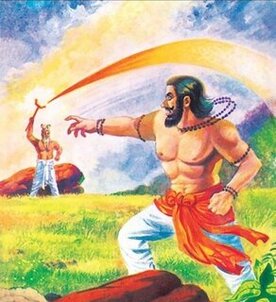 Story of Sage Vishwamitra and Sage Vashishtha
Story of Sage Vishwamitra and Sage Vashishtha
Sage Vishwamitra was previously the valiant king Satyarath. Once Satyarath went to the jungle with his army on a hunting expedition. By evening, he and his army were tired, thirsty and hungry. In search of water they finally reached sage Vashishtha’s hermitage. Contrary to his expectation, they got splendid hospitality, with excellent food, water and a place to rest. The king was astounded by this and enquired about how sage Vashishtha had so much resources.
Sage Vashishtha was the divine son of creator Brahma and was a God realized saint. He had been given the divine cow Nandini which fulfilled all his needs. When the king found out that a cow can fulfill all material needs, he was overcome by greed. He asked sage Vashishtha for the cow. The sage refused because the cow had been given to the sage to aid in his spiritual austerities, not for material pleasures. Since the king's desire was not fulfilled, his greed turned into anger. This was the beginning of the ill-will in the king against the sage.
The king ordered his soldiers to forcefully take away the cow. From the cow emerged valiant warriors who effortlessly defeated Satyarath's army. Satyarath felt humiliated. Hence, he decided to give up his kingdom and undergo severe penance in order to attain spiritual powers comparable to those of sage Vashishtha. His penance gave him the stature of a rajarshi.
To avenge his disgrace Vishwamitra used those spiritual powers to repeatedly attack sage Vashishtha . However, he always lost as he was never able to match up to the spiritual powers of sage Vashishtha since a jeev can never match up to a God realized saint.
Also, despite his severe austerities, Vishwamitra could not gain control over his desires or anger. Because of this, he repeatedly used up his spiritual powers through his actions, and repeatedly tried to earn more by more severe penance and austerities. Eventually, he became dispirited due to his repeated failures and was extremely angry. Finally in a moment of extreme jealousy and hatred, having lost his wisdom and intellect, he took a decision to kill sage Vashishtha in his sleep.
Sage Vashishtha was the divine son of creator Brahma and was a God realized saint. He had been given the divine cow Nandini which fulfilled all his needs. When the king found out that a cow can fulfill all material needs, he was overcome by greed. He asked sage Vashishtha for the cow. The sage refused because the cow had been given to the sage to aid in his spiritual austerities, not for material pleasures. Since the king's desire was not fulfilled, his greed turned into anger. This was the beginning of the ill-will in the king against the sage.
The king ordered his soldiers to forcefully take away the cow. From the cow emerged valiant warriors who effortlessly defeated Satyarath's army. Satyarath felt humiliated. Hence, he decided to give up his kingdom and undergo severe penance in order to attain spiritual powers comparable to those of sage Vashishtha. His penance gave him the stature of a rajarshi.
To avenge his disgrace Vishwamitra used those spiritual powers to repeatedly attack sage Vashishtha . However, he always lost as he was never able to match up to the spiritual powers of sage Vashishtha since a jeev can never match up to a God realized saint.
Also, despite his severe austerities, Vishwamitra could not gain control over his desires or anger. Because of this, he repeatedly used up his spiritual powers through his actions, and repeatedly tried to earn more by more severe penance and austerities. Eventually, he became dispirited due to his repeated failures and was extremely angry. Finally in a moment of extreme jealousy and hatred, having lost his wisdom and intellect, he took a decision to kill sage Vashishtha in his sleep.
So he took his axe, reached sage Vashishtha's hut and waited for the opportune moment to strike. While he was waiting to strike a blow, he overheard a conversation between sage Vashishtha and his wife Arundhati. Arundhati asked her husband who was the biggest ascetic on earth. The sage replied, "In current times, there is no greater ascetic than Vishwamitra on the entire earth. His only problem is anger, due to which he loses all the spiritual powers that he gains from his austerities. If he lets go of his anger, he can instantly become a Brahmarishi."
Vishwamitra was utterly shocked to know that his sworn enemy whom he had attacked so many times, bore no ill feelings towards him! And the fact that sage Vashishtha was praising him behind his back was proof of no ill-will. Vishwamitra was full of remorse. Crying thus, he knocked on the door of the hut and told sage Vashishtha why he was there. He fell on the sage’s feet and asked for forgiveness. At that very moment his heart was purified. Sage
Vashishtha hugged him and not only forgave him, but since at that moment Vishwamitra was completely surrendered, sage Vashishtha graced him and made him a Brahmarishi that very instant.
Moral
Vishwamitra was utterly shocked to know that his sworn enemy whom he had attacked so many times, bore no ill feelings towards him! And the fact that sage Vashishtha was praising him behind his back was proof of no ill-will. Vishwamitra was full of remorse. Crying thus, he knocked on the door of the hut and told sage Vashishtha why he was there. He fell on the sage’s feet and asked for forgiveness. At that very moment his heart was purified. Sage
Vashishtha hugged him and not only forgave him, but since at that moment Vishwamitra was completely surrendered, sage Vashishtha graced him and made him a Brahmarishi that very instant.
Moral
- Saints are beyond Maya hence are unaffected by the vices of Maya like anger, greed or revenge. Even when Vishwamitra was repeatedly attacking him, Vashishtha remained calm all along. When a jeev commits sins, saints understand the reason behind it. They are always overcome by the feeling of kindness towards jeev who is afflicted by the vices of Maya. They repeatedly forgive jeev and wait in the hope that the jeev will turn around for the better one day and become truly good. Saints can do nothing but bestow grace.
- Always remember - One should never act in anger. Actions done in anger always lead to a total downfall.
- One cannot overcome Maya and its vices even through efforts equivalent to thousands of years of penance. The heart can be purified only by surrendering to a God realized saint and shedding tears of remorse. Once the heart gets purified, Guru graces the surrendered soul to overcome the ocean of Maya and bestows His divine divine grace upon him.
Some Pointers to Explore our Literature
Indulge yourself in spiritual material - Click on the images below or the headers
Divya Sandesh
|
Divya Ras Bindu
|
Spiritual Terms
|
|
We would love to hear from you. Please
|
To get notification about our publications please subscribe by entering the information above
|



